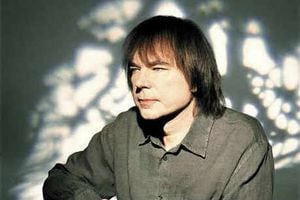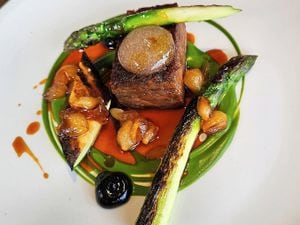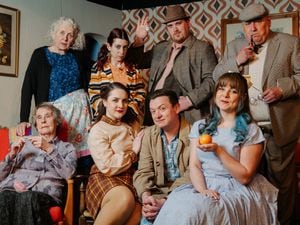Night of firsts for cellist Julian Lloyd Webber
It was a night of firsts as celebrated British cellist Julian Lloyd Webber brought the English Chamber Orchestra to Shropshire.

Not only was it one of the first times Lloyd Webber had conducted an orchestra at all, but he confessed to the audience before the concert: "Perhaps I shouldn't tell you this, but I've never done any of these pieces before."
The concert at St Chad's Church in Shrewsbury, part of Shropshire Music Trust's programme, also witnessed the world premiere of an arrangement of a piece by his father, William Lloyd Webber, who himself was taught by Vaughan Williams.
His father's work, The Moon, was originally written as a four-piece song but Friday night was arranged for a small orchestra.
"It's a nice piece isn't it?" Lloyd Webber said afterwards. "It was written as a choral piece, and it shows, but it's a nice piece."
In a night largely devoted to English music by the likes of Elgar, Delius and Vaughan Williams, there was one European excursion into Italian music, when Lloyd Webber was joined by his Chinese wife Jiaxin Lloyd Webber for the Vivaldi concerto for two cellos. The couple have played and recorded the cello repertoire together all over the world and last night were signing copies of their CD A Tale Of Two Cellos after the concert.
Earlier Lloyd Webber had spoken with young Shropshire conductor Fergus Macleod about the appeal the English repertoire holds for him.
"I really love all these pieces. We all feel this music in our bones, Elgar, Delius and so on," he said. "And the border country with Wales was always very special to Elgar, of course."
Asked how he had approached conducting the English Chamber Orchestra for the first time, Lloyd Webber replied: "Conducting is definitely a different art. I've learned to take a back seat, if you overdo it you actually get in their way."
He also spoke of the importance of his Shropshire involvement with his musical charity In Harmony, formed with the idea of delivering social and educational benefits to disadvantaged communities by encouraging participation in music. As well as projects in places including Venezuela, Liverpool and London, there is one based in Malinslee, Telford.
"I've always believed music should be available to everybody and good music should be available to all children," said Lloyd Webber.
"You don't have to come from a privileged background to enjoy and play classical music."
He appealed to his Shrewsbury audience to help support In Harmony in any way they can.
"If you can write letters to your local newspaper or your MP it's a huge help," he said. "I can't think of a better way for a sponsor to spend their money than improving the lives of children."
Review:
As the warm spring sun began its descent over The River Severn and Quarry Park in Shrewsbury it was hard to imagine a setting more quintessentially English.
So it was entirely fitting that world renowned cellist Julian Lloyd Webber should present an evening of music largely by England's most beloved composers inside the beautiful St Chad's Church.
But what made things different for last night's Shropshire Music Trust concert, was that for the most part Lloyd Webber was without his 1690 Stradivarius cello, instead taking on the role of conductor.
Earlier he had admitted that he had learned to "take a back seat" in conducting the two-dozen strong string orchestra, and he guided them through an evening which largely concentrated on the typically warm and pastoral sounds of the English classical repertoire.
Vaughan William's short and bubbly Prelude from 'Charterhouse Suite' gave ways to the grandness of Elgar's Serenade For Strings, the sound in St Chad's sumptuous and full.
Delius's Two Aquarelles conjoured up a moonlit, misty scene, with the cellos threatening to break into a sea shanty, while Elgar's Sospiri was elegant and stately.
With the audience sat in the round and intimately close to the orchestra it occasionally felt as though we were eavesdropping on a private rehearsal.
When Lloyd Webber eventually took to the front of the stage with his cello it was for an electrifying reading of Howard Goodall's beautiful And The Bridge Is Love, Lloyd Webber's playing lean, warm and supple.
After the interval he returned with his wife Jiaxin Lloyd Webber for a short Italian-flavoured interlude with the Vivaldi concerto for two cellos. Sat side by side the two cellists weaved around each other in a piece originally written for mandolins, but which worked marvellously in this arrangement.
The family link was maintained when Lloyd Webber premiered his father William's composition The Moon, originally written for voices but arranged here for orchestra. It was a piece which fitted in perfectly with the theme and feel of the rest of the evening.
In a change to the advertised programme, the evening concluded not with Vaughan William's Fantasia on a theme by Thomas Tallis but instead with the pomp and fireworks of Elgar's Introduction and Allegro, a rousing conclusion to a splendid evening.
By Ian Harvey





